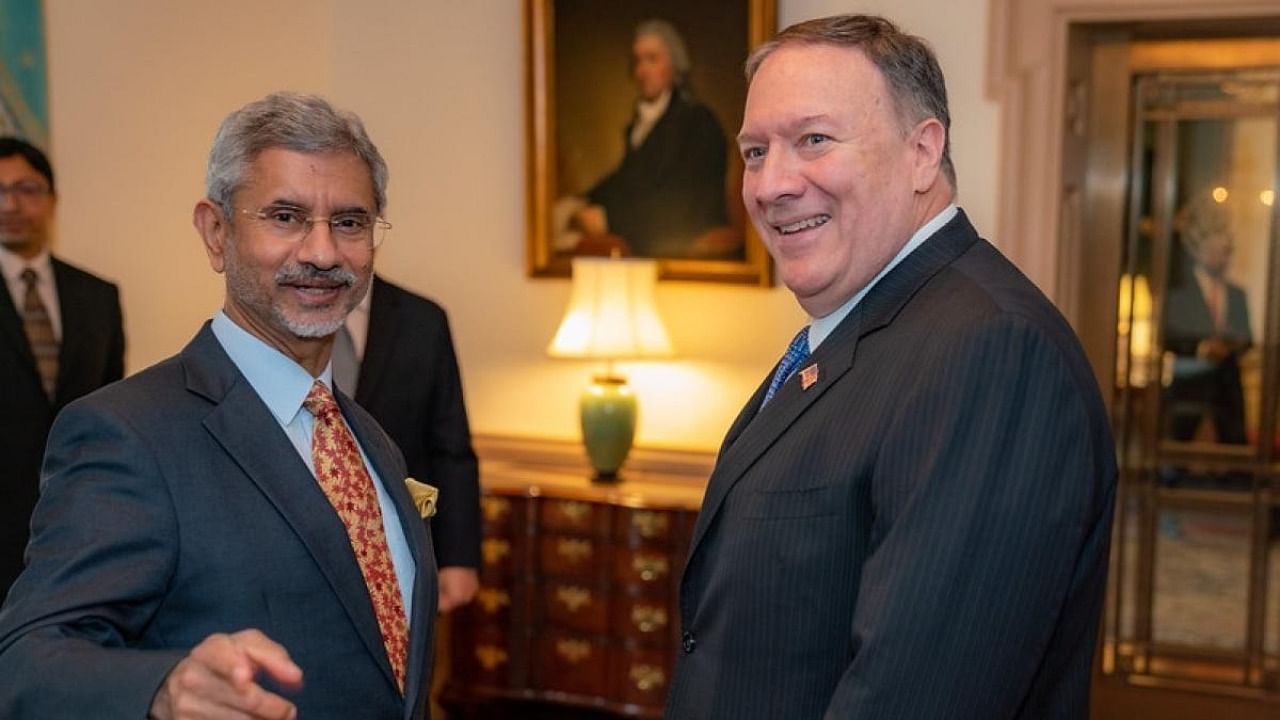
One wonders at the choice of words allegedly used in their first meeting in 2019 by External Affairs Minister S Jaishankar and his then counterpart, United States Secretary of State Mike Pompeo to describe former External Affairs Minister Sushma Swaraj. Pompeo, has quoted some pretty disparaging remarks about Swaraj in his book Never Give an Inch: Fighting for the America I Love, a memoir of his time as Donald Trump’s top diplomat and earlier his CIA chief.
Since Jaishankar has disassociated himself from the remarks ascribed to him, doubt has been created whether it was Pompeo or Jaishankar who made the unkind observations. Jaishankar has said, “I always held her in great esteem and had an exceptionally close and warm relationship with her. I deplore the disrespectful colloquialism used for her”. However, the derisive tone of the entire exchange is undeniable, and it is unclear who actually used the “disrespectful colloquialism”.
Although excerpts have appeared of what Pompeo wrote about his meeting with Jaishankar or “J”, it is worth reading the entire paragraph to make a better judgement:
“We hit it off immediately. In our first meeting, I was bemoaning in very diplomatic speak, that his predecessor had not been particularly helpful. He (Jaishankar) said that he could see why I had trouble with his predecessor, a goofball and a heartland political hack. "Careful, I'm a heartland political hack!" I replied in jest. He laughed, noting that if that were true, it would make me the first heartland political hack who had ever been an editor on the Harvard Law Review. Well played, J."
Pompeo makes it very clear that his complaint about Swaraj was made in “very diplomatic speak”, that is, in polite language, to describe Jaishankar’s predecessor. Jaishankar did not disagree with Pompeo’s assessment, and appears to have strongly empathised with him accepting descriptions that were very undiplomatic.
Dictionaries tell us that ‘goofball’ is American slang for ‘an extremely incompetent, eccentric or silly person’, (a variant of the old English word ‘goff’ meaning a ‘foolish clown’), and that ‘heartland political hack’ is a negative phrase used for an unprincipled politician. In India, heartland politics refers to politics rooted in the rural culture of North India. Was Jaishankar describing or agreeing with Pompeo that Swaraj as incompetent and opportunist or lacked urbane sophistication? This is the “disrespectful colloquialism” that Jaishankar is now trying to disclaim.
Is he on strong grounds in shifting the blame to Pompeo? Pompeo’s text in fact suggests that he humoured Jaishankar, by chiding him for using a derisive phrase for Swaraj that might well describe Pompeo himself. Jaishankar then appears to have cleverly turned it around by suggesting that Pompeo had elevated himself above run of the mill ‘heartland political hacks’ by his selection as the editor of Harvard Law Review. The atmosphere of jokey camaraderie in which this exchange is described suggests that Jaishankar did not defend his predecessor. In fact, in Pompeo’s telling it was he, Jaishankar, who had used undiplomatic language. Jaishankar, thus, comes across as someone willing to throw Swaraj under the bus to ingratiate himself with Pompeo.
Jaishankar has not contested a single direct election. He cannot even conceive of surpassing Swaraj’s record of having won seven Lok Sabha elections and three Assembly elections. She was the youngest minister ever at the age of 25 in Haryana. As the External Affairs Minister, she probably helped more Indians, both at home and abroad, in her five-year tenure in the foreign office than any other occupant of that position. The Wall Street Journal described her as ‘India’s best-loved politician’.
Far from being naïve and clownish, or uncouth, Swaraj was multi-lingual, sophisticated, and polite in her interactions. She was particularly solicitous of her ideological opponents — recall the picture of Congress President Sonia Gandhi hugging her affectionately in Parliament House. In this she was very different from the emerging clique of unnecessarily arrogant BJP leaders.
In his attempt to strike a responsive chord with Pompeo, (who somewhat patronisingly praises Jaishankar’s skill in English), Jaishankar perhaps forgot that it is ‘heartland politicians’ who have taken the Bharatiya Janata Party (BJP) from two seats in Parliament to an overwhelming majority. They have been generous in conceding to him one of the highest positions in their government.
It is the ‘heartland political hacks’, cutting across the political spectrum, who keep Indian democracy alive. Contrary to popular belief, they earn their place in Parliament through the enormous amounts of service they give to their constituencies. Most do not get parachuted into top positions, and have to earn their spurs by charting their careers through uncertain and unpredictable political waters.
It is surprising that no one from the BJP has called Jaishankar out for his alleged remarks although his disdain for politicians is clear. He has tried to pre-empt any criticism by trying to shift the blame. However, his alleged derision and glibness may still cost him dear, because even if no one speaks up for Swaraj in the current regime, none of them can ever be sure how they will be described by him behind their backs.
A derisive neologism coined by the votaries of Hindutva is ‘Macaulayputra’ (literally, one of Macaulay’s lineage). It implies Indian elites whose anglicised and privileged education has produced slavish minds and who tend to give themselves superior airs because of familiarity and ease with the culture of the colonisers. Thomas Macaulay sought to create an English educated class in India, “who may be interpreters between us and the millions whom we govern; a class of persons, Indian in blood and colour, but English in taste, in opinions, in morals, and in intellect.”
Jaishankar's eagerness to pander to the biases of the American may well be an excellent example of Hindutva’s failure to ‘decolonise’ the minds of its own leaders.
(Bharat Bhushan is a Delhi-based journalist.)
The views expressed above are the author's own. They do not necessarily reflect the views of DH.